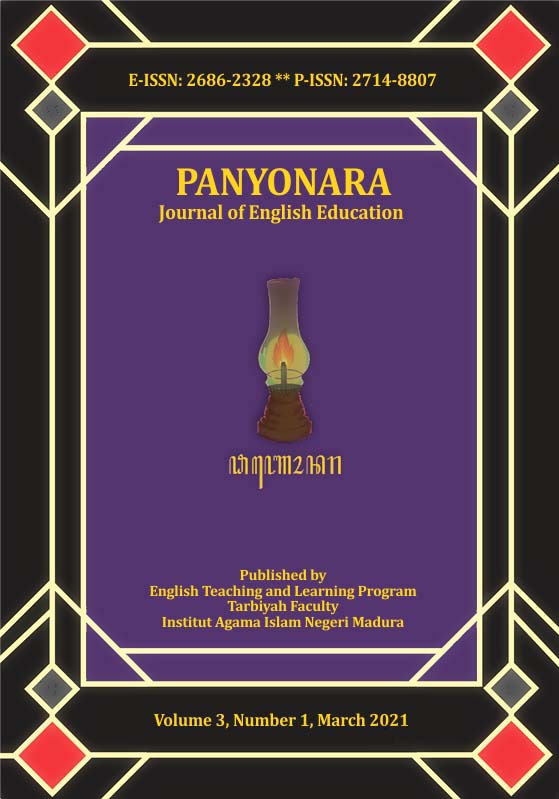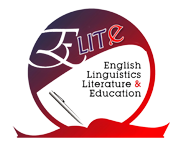The Crucial of Students’ Self-Actualization in Teacher Talk Framework to Increase the Students Speaking Skill
 Abstract views: 439
,
Abstract views: 439
,
 PDF downloads: 313
PDF downloads: 313
Abstract
Every teacher should have an appropriate teaching method, including speaking. One of the indispensable parts of foreign language teaching, especially in speaking skills, is teacher talk. Students need teacher talk that is elaborated with the entire self-actualization in increasing their speaking skill. The research was intended to know how the teacher talk's theoretical framework used by the teacher to increase students self-actualization in speaking performance. This research was descriptive qualitative research because it described teacher talk between the teacher and students in the classroom. The data collection instruments were observation and interview. This research showed that students are more active in expressing their ideas, and the classroom was more harmonious. Some of them also were more confident to convey information to the teacher without asked. It can be concluded that teacher talk is essential in increasing self-actualization to get better performance in speaking English.
Downloads
References
Boden, K. K., Zepeda, C. D., & Nokes-Malach, T. J. (2020). Achievement Goals and Conceptual Learning: An Examination of Teacher Talk. Journal of Educational Psychology, 112(6), 1221–1242. doi: 10.1037/edu0000421
Brail, D., & Sinclair, J. (1982). Teacher Talk (Vol. 60). Oxford: Oxford University Press.
Burns, A., & Joyce, H. (1997). Focus on Speaking. Sydney: National Centre for English Language Teaching and Research.
Cullen, R. (1998). Teacher talk and The Classroom Context. ELT Journal, 52(3), 179–187. doi: https://doi.org/10.1093/elt/52.3.179
Cunningham, A. R. R. (2008). Maslow’s Theory of Motivation and Hierarchy of Human Needs: A Critical Analysis. California: University of California–Berkeley.
Farrell, T. S. C. (2014). Promoting Teacher Reflection in Second Language Education: A Framework for TESOL Professionals. London: Routledge.
Folse, K. S. (2006). The art of teaching speaking: Research and Pedagogy for The ESL/EFL Classroom. Michigan: The University of Michigan Press.
Hadi, S. (2019). Metodologi Riset. Yogyakarta: Pustaka Belajar.
Haqiqiyah, M. (2020). The Predictability of English Reading Skill from Indonesian Reading Skill and English Knowledge at Students of SMAN 1 Pademawu-Pamekasan. Al-Insyiroh: Jurnal Studi Keislaman, 6(2), 1–19. doi: https://doi.org/10.35309/alinsyiroh.v6i2.3917
Jørgensen, H. (2000). Student Learning in Higher Instrumental Education: Who is responsible? British Journal of Music Education, 17(1), 67–77. doi: https://doi.org/10.1017/S0265051700000164
Kamali, K., Mansur, M., Nur Masithoh, F., Kunaifi, A., & Sukamto. (2020). Mekanisme Pricing and Product Display Toko Klontong Pesantren Salaf: Studi Kasus Pondok Pesantren Panyeppen. Al-Tsaman : Jurnal Ekonomi Dan Keuangan Islam, 2(02), 48–62.
Long, M. (1996). The Role of The Linguistic Environment in Second Language Acquisition. Handbook of Second Language Acquisition.
Luoma, S. (2004). Assessing Speaking. Ernst Klett Sprachen.
Maslow, A. H. (1981). Motivation and Personality. New York: Prabhat Prakashan.
Nunan, D. (1991). Language Teaching Methodology (Vol. 192). Sydney: New York: prentice hall.
Pressley, M., Mohan, L., Raphael, L. M., & Fingeret, L. (2007). How Does Bennett Woods Elementary School Produce such High Reading and Writing Achievement? Journal of Educational Psychology, 99(2), 221.
Qashoa, S. H. (2013). Effects of Teacher Question Types and Syntactic Structures on EFL Classroom Interaction. The International Journal of Social Sciences, 7(1), 52–62.
Rivers, W. M. (2018). Teaching Foreign Language Skills. Chicago: University of Chicago Press.
Rohmah, T. (2017). Classroom interaction in English Language Class for Students of Economics Education. Arab World English Journal (AWEJ), 8(2). doi: https://dx.doi.org/10.2139/ssrn.3005587
Sayadi, Z. A. (2007). An Investigation into First Year Engineering Students’ Oral Classroom Participation: A Case Study. Universiti Teknologi Malaysia.
Ur, P. (2012). A Course in English Language Teaching. Cambridge: Cambridge University Press.
Wasi’ah, N. (2016). A Study of Teacher Talk in Classroom Interaction at an Islamic Senior High School. OKARA: Jurnal Bahasa dan Sastra, 10(1), 29–43. doi: http://dx.doi.org/10.19105/ojbs.v10i1.809
Yanfen, L., & Yuqin, Z. (2010). A Study of Teacher Talk in Interactions in English Classes. Chinese Journal of Applied Linguistics, 33(2), 76–86.
Ying, Q. U. (2011). The Influence of Communicative Teacher Talk on College Students’ Interlanguage. Sino-US English Teaching, 8(9), 571–576.
The journal uses an Open Access policy under a Creative Commons Attribution-NonCommercial 4.0 International License. Authors who publish with this journal agree to the following terms:
- Authors retain copyright and grant the journal right of first publication with the work simultaneously licensed under a Creative Commons Attribution License that allows others to share the work with an acknowledgment of the work's authorship and initial publication in this journal.
- Authors are able to enter into separate, additional contractual arrangements for the non-exclusive distribution of the journal's published version of the work (e.g., post it to an institutional repository or publish it in a book), with an acknowledgment of its initial publication in this journal.
- Authors are permitted and encouraged to post their work online (e.g., in institutional repositories or on their website) prior to and during the submission process, as it can lead to productive exchanges, as well as earlier and greater citation of published work.
















